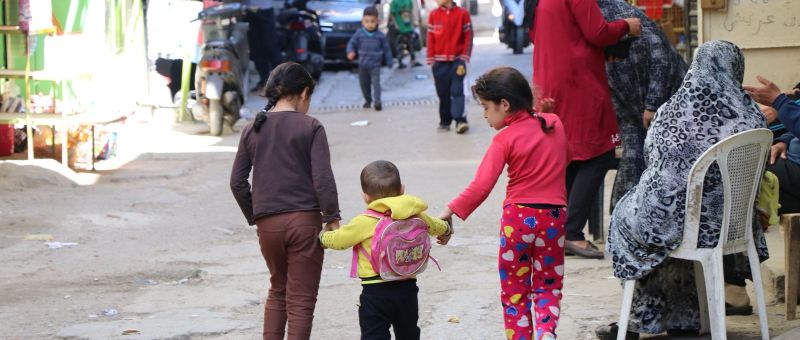Displaced communities - whether long-time residents of camps and urban areas, or newly arrived refugees - are also often hosts, offering support to fellow refugees through community-led initiatives, or simple acts of everyday hospitality. This 'refugee-refugee humanitarianism' disrupts mainstream humanitarian narratives, which typically frame displaced peoples as passive recipients of aid. In order to challenge…
Tag: refugee
تضامن اللاجئين مع اللاجئين في الموت والممات
تضامن اللاجئين مع اللاجئين في الموت والموتى من قبل إيلينا فيديان-قاسمية، جامعة كلية لندن (UCL) ، يوسف م. قاسمية، جامعة أكسفورد (University of Oxford) البدّاوي مخيمٌ للاجئين الفلسطينيين في منطقة حضرية على ضواحي طرابلس شمال لبنان. منذ نشوء المخیم في الخمسینات من القرن الماضي، كان مسكناً للفلسطينيين المقيمين وأحفادهم منذ ذلك الحین، وللاجئين الآخرین النازحین…
Why Host Refugees?
Displacement is mostly experienced in urban contexts, meaning that the vast majority of refugees live alongside, and often within the very houses of, their hosts, including established refugee communities, or 'refugee hosts'. In this piece, which is a re-posting from the Oxford Brookes Centre for Development and Emergency Practice blog, Zoe Jordan examines the dynamics…
Al-Mustaqbal in the Space of Refuge
Displacement forces refugees to confront restrictions to their mobility, whereby the policies of states and other actors tend to physically limit their access to space. However, as Jude Wafai argues in this piece, this immobility is often combined with challenges that restrict refugee futures too. By exploring how space interacts with temporality in this way,…
The Localisation of Aid and Southern-led Responses to Displacement
The Localisation of Aid and Southern-led Responses to Displacement: Beyond instrumentalising local actors By Elena Fiddian-Qasmiyeh, Refugee Hosts PI and UCL Displacement is primarily a ‘Southern’ phenomenon, with around 90% of all refugees having fled from one country in the global South to another Southern state, through processes of South-South migration. It is equally the…
A Successful Alternative to Refugee Camps: A Greek Squat Shames the EU and NGOs
In light of the limited hospitality offered to refugees and asylum seekers by European states, local communities, volunteers, faith groups and activists have often acted as key providers of support and solidarity. In this piece, Zareena Grewal (Yale University) demonstrates the important role such local initiatives are playing in Athens and Lesbos, including in spaces such…
Protestimony
As part of her research into how humanitarianism has been changed by Calais, Hari Reed and collaborators, under the umbrella of the IMAGINE charity, have curated an exhibition called Protestimony, which was first shown at the Edinburgh Festival in August 2017. Here she showcases some of the images, questions and dilemmas of the show. Protestimony…
‘Refugees. Present/Absent.’ Escaping the traps of refugee (mis)representations
In this piece, Dominika Blachnicka-Ciacek explores the problematics of photographic representations of singular suffering refugees and their impact on political discourse in Poland. In a challenge to this, Dominika reflects on her own approach to representations, reflected in her "Refugees. Present/Absent" exhibition, which sought to focus on the materiality of everyday experiences and the refugee journey as a…
Refugees are Dialectical Beings: Part Two
Refugees are Dialectical Beings: Part Two by Yousif M. Qasmiyeh, University of Oxford and Refugee Hosts Writer in Residence To the ones who are en route, the ones whose stomachs are compasses and whose compasses are manifestos of nothing… Refugees are dialectical beings I The aridity of a camp presupposes the aridity of life.…
Summer Newsletter
Our Summer newsletter is now available to view online. This issue highlights our activities over the summer, as well as our recent Faith and Displacement series, which you can read in full on our website. Please follow the link below for important project updates, including blog highlights and information on recent and forthcoming events: Newsletter…










You must be logged in to post a comment.